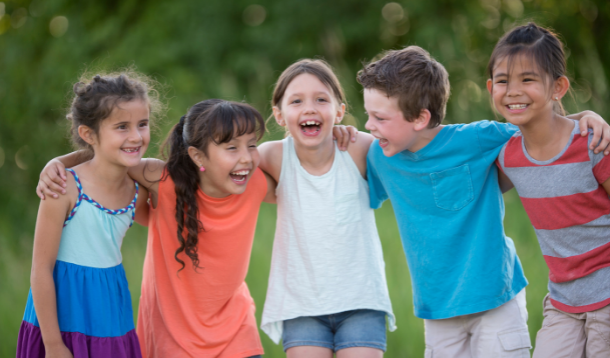
We’ve now been living in a global pandemic for almost two years. But someday we’ll be able to look back and laugh about it, right? While nothing may seem further from the truth, there is cause to believe that what we all need now more than ever, is a little laughter in our lives.
Disruptions caused by COVID-19 have created exceptional uncertainty for all of us, which has led to increased anxiety. For children, that impact is especially troubling due to potential long-term effects if the anxiety is left unaddressed. According to Cristina Lima, a registered clinical counsellor with ABLE Developmental Clinic, she and her colleagues perceive that the number of children experiencing anxiety during COVID has increased by five times.
And while anxiety is and always will be a part of our lives, it’s critical that we help our kids to manage and cope with anxiety so that they can tolerate the uncertain. And that’s where one of mankind’s natural coping mechanism comes in, humour.
Research shows that laughter increases adrenaline and oxygen flow, which then stimulates the heart, lungs and muscles, and produces endorphins – which we all know make you happy (thank you, Elle Woods). And ultimately, this activates the body’s relaxation response which leads to a decrease in cortisol levels – the stress hormone – and leads you to feeling more relaxed and calmer.
As Lima perfectly summarizes, “anxiety and laughter cannot be concurrent, meaning that the mind cannot genuinely experience these two emotions at the exact same moment.”
But there are more benefits to humour than just the physiological. Through laughter and other exercises that allow for mindfulness, we’re able to ground ourselves in the here and now of the situation. “Laughter brings us back to the present moment, in a way that is similar to mindfulness practices,” says Lima.
Studies also show that by calming the mind through laughter, we can help kids to become more creative and to be better problem solvers and decision-makers. This allows them to become more resilient and to manage the many obstacles and challenges we face in our lives – like a global pandemic.
So, what can we do to help our kids use laughter as a way to cope with anxiety? Here are a few tips to keep in mind before you launch into your own stand-up routine.
Lima advises that parents should acknowledge their children’s feelings when they are feeling anxious and then use that moment once you’ve genuinely connected with them to crack a joke or use humour. “If you can find a way to use humour to make them laugh, we are doing them a huge favour.”
Embarrassing your kids is part of the job description of being a parent. So, give them something to really roll their eyes at and show your kids how you can laugh at yourself while being silly. Watch funny movies together, have a joke-telling contest, show them your best 80s dance moves – be present in the experience. “A shared sense of humour – the kind that bonds a family and community – is not only appropriate during tough times. It’s essential,” says humourist and author Gina Barreca.
No one knows your kids better than you do as their parent. You know what they find funny and can use those insights to bring them back to the present moment through laughter. “Parents have this great resource, the knowledge of knowing their kids deeply. They are in the best position to really support their kids, including when it comes to laughter,” says Lima.
As a parent, you also know when it’s time to call for back-up. Whether that be looking into public or private options, taking your child to a counsellor may be the right step for your family. Anxiety Canada is an excellent resource with videos, an online directory, and other helpful tools.
The earlier days of the pandemic saw increased support from educators on the importance of mental health. More emphasis was placed on physical activities and mindfulness exercises; however, Lima feels that the focus has shifted and it’s no longer as much of a priority. But with anxiety being ever-present, shouldn’t we be making this a priority for our children? While there’s much to be done outside of schools, there is great opportunity to promote increased efforts on mental health. And bringing comedy into the classroom could be one such way to help kids manage their anxiety.
Helping our children through stressful situations like a pandemic requires a team effort – one that involves parents and other family members, as well as teachers and school boards. “It’s as important as talking about academics and extracurricular activities. We need to talk about mental health in a more meaningful and expansive way,” says Lima.
And laughter may be only one of the many ways in which we can support our children manage their anxiety, but its benefits (physiological, psychological, and more) can’t be overlooked.
So, is laughter really the best medicine? It certainly doesn’t hurt.